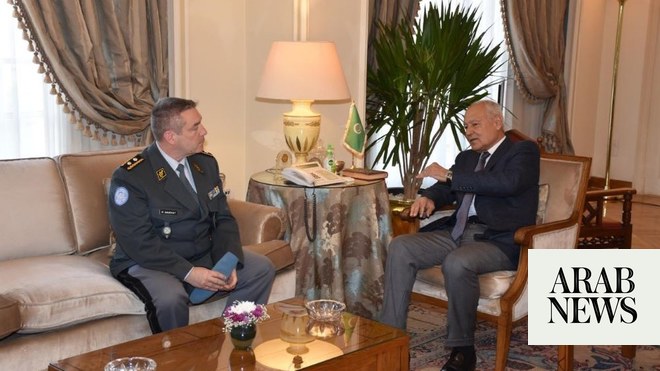
Arab League assistant secretary-general tells Lebanese politicians: ‘You know the way to solution and yet you are not taking any steps’
BEIRUT: Arab League Assistant Secretary-General Hossam Zaki held talks in Lebanon on Monday to try to ease a rift with Saudi Arabia over criticism of its role in the Yemen war.
Zaki said the purpose of his visit is to “familiarize himeself with the Lebanese position and make an effort to promote a convergence of opinion and resolve problems with Saudi Arabia.”
Zaki stressed that the Lebanese crisis with Saudi Arabia and other Gulf countries “is not simple and goes beyond a minister’s account of what is happening in Yemen. It is an integrated position on the situation, and this is what Saudi Arabia has condemned. The Lebanese position is different from Arab decisions on the Yemeni issue.”
Zaki held talks with President Michel Aoun, Prime Minister Najib Mikati, Parliament Speaker Nabih Berri and Foreign Affairs Minister Abdullah Bou Habib.
His talks came against the backdrop of the diplomatic crisis between Saudi Arabia and Lebanon that started on Oct. 29 after the airing of remarks by Information Minister George Kordahi on the Yemen conflict.
Mikati told Zaki that “Lebanon is keen on restoring normal relations with Saudi Arabia and the Gulf states and will make every possible effort to remove the gaps in these relations and address the differences in the spirit of brotherhood and cooperation.”
He said Lebanon “is committed to all Arab League decisions regarding the Yemeni crisis, stemming from the Security Council resolution, the Gulf initiative, and the principle of dialogue between the concerned parties.”
Zaki confirmed in a statement that if he needs to visit to Saudi Arabia, he will do so.
However, he said that “the majority know the way to solve the Saudi-Lebanese crisis, but no one has taken a single step.”
Political observers say that “Kordahi’s resignation and taking serious steps to prevent drug smuggling into the Kingdom may be the gateway to the solution.”
Addressing a press conference at the Lebanese Foreign Ministry, Zaki said: “What must be done to start addressing the current crisis is clear and we must all continue to work hard because the relationship between Lebanon and the Gulf countries, especially Saudi Arabia, is an old, well-established and important relationship for both parties, but the matter needs an effort that we hope everyone will make and seek to achieve.”
He said that “the issue is far from being taken lightly.”
The prime minister has been unable to achieve any breakthrough in the crisis of the relationship with the Gulf as Hezbollah is rejecting Kordahi’s resignation unless it receives guarantees.
Last weekend, Mikati asked Kordahi to “do what his national conscience dictates,” that is, to submit his resignation.
Kordahi refused to do so, taking the position of the leader of the Marada Movement, Suleiman Frangieh, an ally of Hezbollah and the Syrian regime.
Hezbollah has said that Kordahi’s resignation would undermine “national sovereignty.”
The diplomatic rift has put further pressure on the Lebanese government, which is already suffering from a crisis provoked by Hezbollah.
Hezbollah has blocked the participation of its deputies and those of the Amal movement in the Cabinet sessions until the dismissal of the judicial investigator in the port explosion case, Judge Tarek Bitar, and the ending of investigations into the Tayouneh clashes.
The Tayouneh clashes started after Hezbollah’s protest against Judge Bitar turned into an armed confrontation with the people of Ain Al-Rummaneh neighbourhood, including members of the Lebanese Forces party.
There are still efforts to dismiss Judge Bitar from the port blast case.
The most recent of these was the ruling of Judge Habib Mezher, head of Chamber 15 of the Appeals Court, to dismiss Bitar.
Mezher’s move provoked a storm of reaction.
Prosecutors for the foreign victims of the explosion filed a complaint with the Judicial Inspection Authority and the Supreme Judicial Council against Mezher “due to the grave errors in his decision.”
The Beirut Bar Association submitted a review to the Civil Court of Appeal to say that Judge Mezher’s “intervention in Judge Bitar’s response file and taking unilateral decisions is illegal.”
As of Monday, the number of lawsuits filed against Bitar by politicians he had accused over the explosion reached 16.
These aim to paralyze his investigations and dismiss him from his role.
Former Prime Minister Hassan Diab and former ministers Ali Hassan Khalil, Ali Zuaiter, Nohad Al-Machnouk and Youssef Finianos are all seeking to avoid appearing before the judge.












